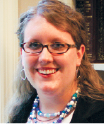By Melissa Wuske
 One Sunday my church focused on personalities by breaking into groups based on Gary Smalley’s Lion/Otter/Golden Retriever/Beaver personality types. The goal was to talk about what skills and gifts each type brings to the church and to relationship with God, and to understand how to better relate with each other. But when I got into my golden retriever circle, instead of feeling in awe of the diversity of gifts God’s put in our church, I felt safe.
One Sunday my church focused on personalities by breaking into groups based on Gary Smalley’s Lion/Otter/Golden Retriever/Beaver personality types. The goal was to talk about what skills and gifts each type brings to the church and to relationship with God, and to understand how to better relate with each other. But when I got into my golden retriever circle, instead of feeling in awe of the diversity of gifts God’s put in our church, I felt safe.
There was an instant comfort in knowing that the people in my circle were like me. When I sat in my comfort zone and looked out at the other groups, I could easily categorize (even judge!) everyone else: in that group were people who scare me, over there were the people who could get a project done well, and in that far circle were people who had trouble sitting still and being quiet.
Already United
Gathering by similarity is natural, and to some degree practical: we assemble by age, relationship status, kids’ ages, whether we grew up in church or are new, our work, our neighborhoods, and whether we volunteer on the same committees or agree in theologically grey areas.
Too often, though, our comfort trumps God’s view of his people. Christ is our primary identity; it’s an identity we share equally with every member of the body of Christ everywhere. Unity sometimes seems like a choice I get to make, but it’s the truth of who I am—I am unified with others in Christ. Whether I act like we’re united is my choice.
Living the Truth
Reaching out to someone different is an act of faith. Connecting with someone whose life stage or faith story is different from mine affirms my belief that Christ is the center. It’s a testimony to me, the church, and the world that what God says is true.
When “I like being with these people” turns into “I can’t relate to those people,” I forsake the unity God has already given. I forget that I can do the impossible, “be perfectly united in mind and thought” with others when I act in faith that Christ is above everything—even our differences (1 Corinthians 1:10).
Melissa Wuske is a freelance editor, writer, and the communications director for Stop Traffick Fashion. She lives in Boston with her husband, Shawn.



Comments: no replies